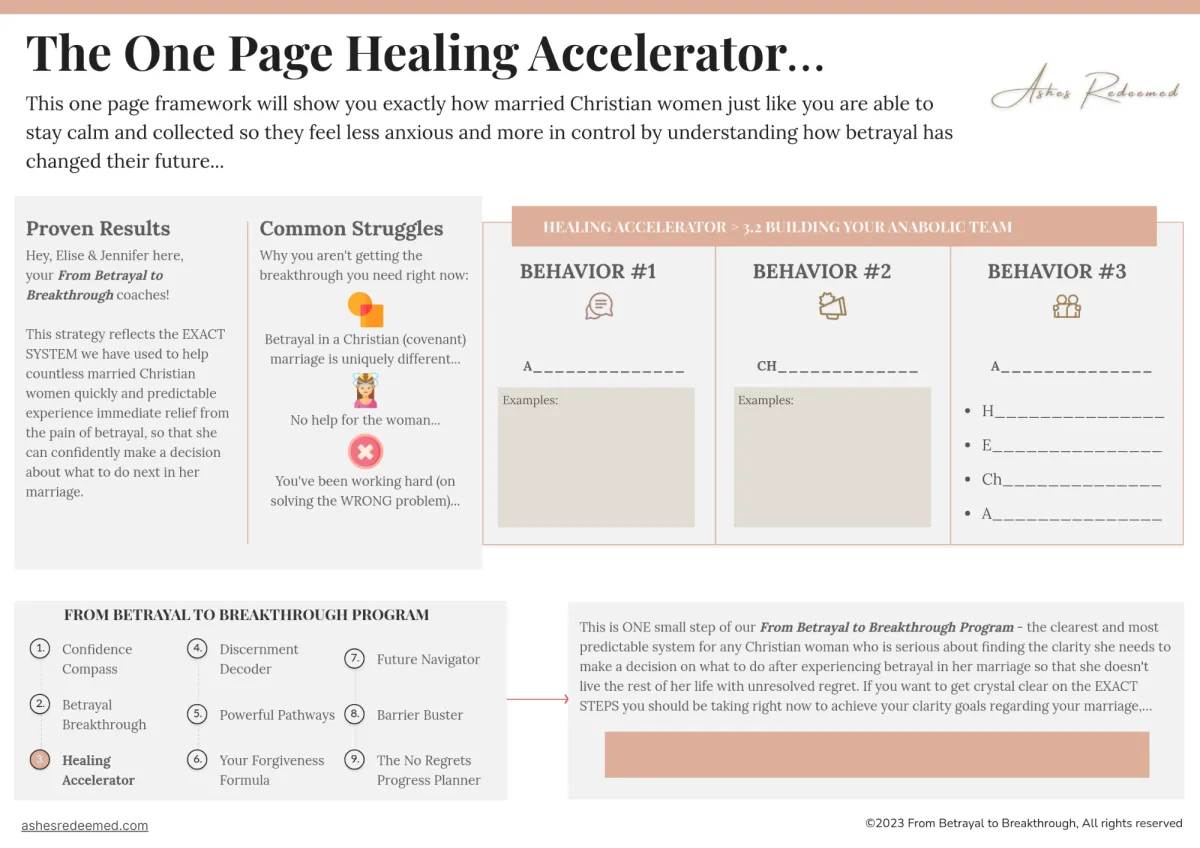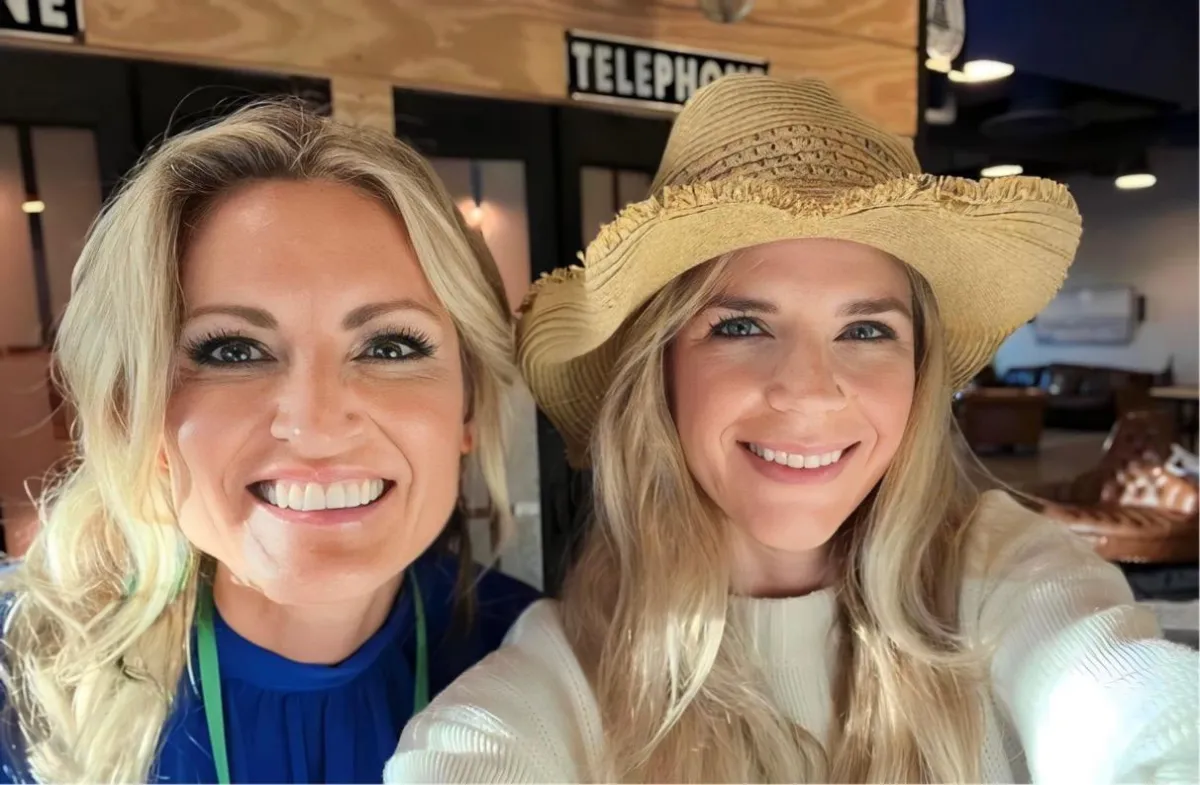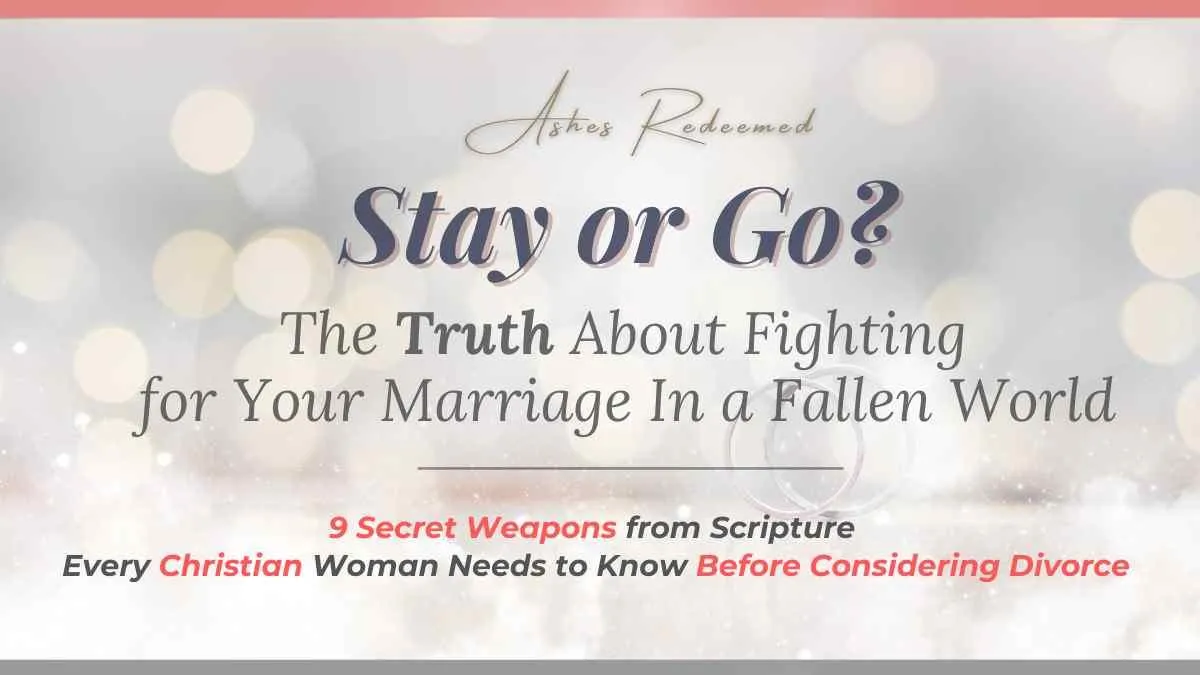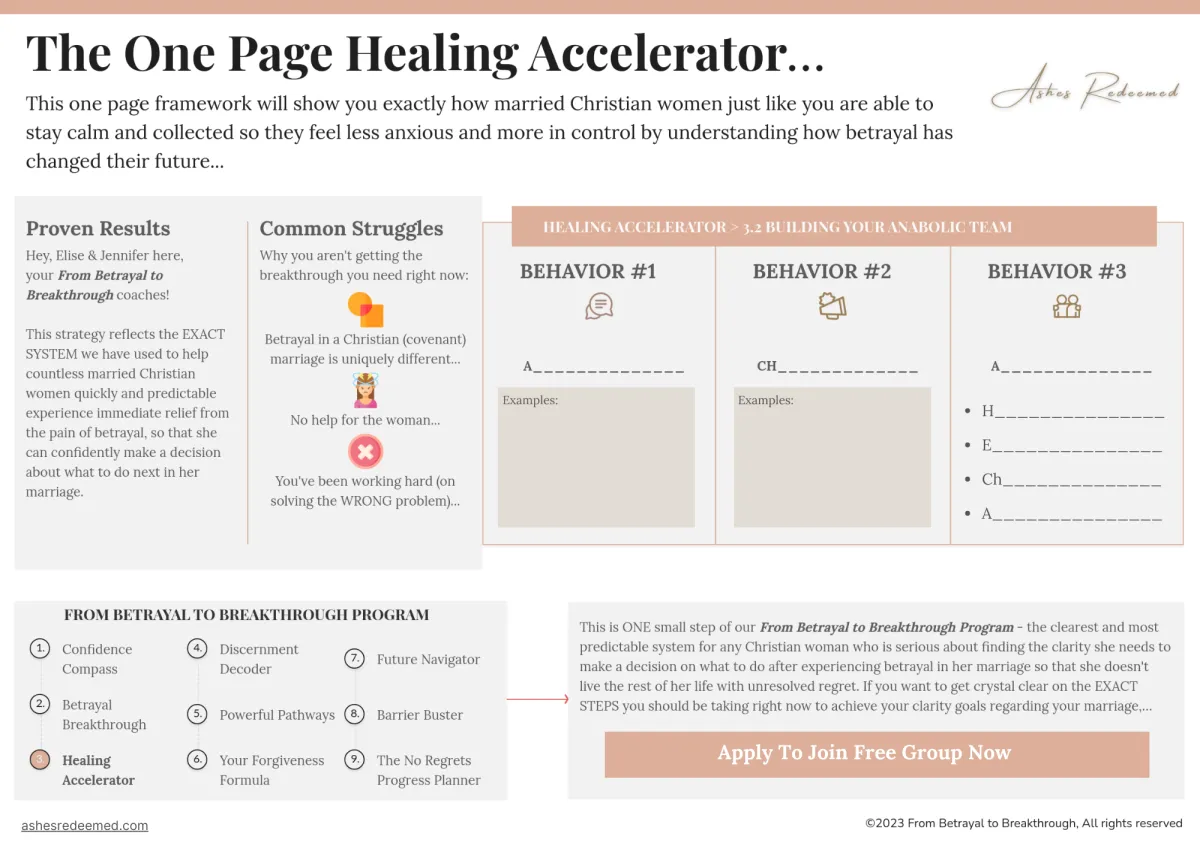
Marriage Coaching for Christian Women
Coming Soon!
Free Resource Library
Scroll down to see:
The Ashes Redeemed Blog
Bi-Monthly Faith & Fellowship Zoom Calls
On-Demand Trainings
Free Resource Library
Scroll down to see:
The Ashes Redeemed Blog
Bi-Monthly Faith & Fellowship Zoom Calls
On-Demand Trainings
The Ashes Redeemed Blog

Ashes Redeemed Newsletter | January 2025
In This Issue:
Monthly Devotional: Unseen Renewal: Nurturing the Soul Within Community
Fidelity Focus: Inviting Conviction: When God Deals With Your Husband
Ask Ashes Redeemed: "Am I really making too big of a deal about this?"
Editor's Pick: The #1 Common Struggle With Finding Clarity After Betrayal
Upcoming January Events & Next Bible Study Sneak Peek!
Renewal
When New Year’s Day Feels More Like Groundhog Day
by Elise Park
The beginning of another year is often touted as the perfect opportunity to start over.

But it’s not a fresh start everyone, is it?
For those living in the midst of an ongoing difficulty or crisis, the New Year’s holiday can be an unpleasant reminder that “nothing’s changed.”
Maybe this person can’t fathom how to rebuild their life after a layoff.
Maybe this person is waiting for the legal system to finally deliver justice.
Maybe this person is waiting for the spiritual conviction of their wayward spouse.
As others celebrate new milestones and embrace the passing of the seasons, the person stuck between a catastrophic event and its resolution might feel as though they’re experiencing the same day over and over again. (Remember the 1993 movie, Groundhog Day?)
Another day. Another delay. Another disappointment.
The temptation to fall into utter despair can be too much to bear.
So how is the Christian supposed to endure these trials–when the prayers and longings for closure seem to go unanswered, month after month, year after year?
I think some of our biggest frustrations with long bouts of uncertainty may stem from the expectations we’ve developed about our life, our faith, and the circumstances we’re in.
We may think things like:
“I’ve followed God my whole life–I don’t deserve this.”
“God says He’s always with me, but if that were true, then I wouldn’t feel so alone.”
“I’ve done ‘everything right’ in my marriage–HE/SHE was the one who sinned against ME!”
If we’re not careful, we can inadvertently view faith in our Savior as a transaction between a man and his genie.
Thomas Merton says,
“If we are not humble, we tend to demand that faith must also bring with it good health, peace of mind, good luck, success in business, popularity, world peace, and every other good thing we can imagine. And is it true that God can give us all these good things if He wants to. But they are of no importance compared with faith, which is essential. If we insist on other things as the price of our belief, we tend by that very fact to undermine our own belief.”
These things aren’t typically considered until we’re already in the crucible, being tested and tried.
We may say and believe that our hope is in the Lord.
We may say and believe that our faith rests in the promises of God.
We may say and believe that His strength is made perfect in our weakness (2 Cor. 12:9).…
…only to one day discover that our hope was actually in the expectation of a life free from misfortune, a God who makes us feel good, and who gives us a sense of interior equilibrium.
So what then is the appropriate response for the Christian, when things fall through and our faith isn't quite what we thought it was?
Humility.
While despair tempts us to focus solely on ourselves and our problems, humility invites us to focus on Christ.
Despair is a heavy, wet blanket, dragging us down and exhausting our energy.
Humility is like light shining through a clean window.
Despair keeps our thoughts focused on yesterday’s regrets and tomorrow’s uncertainties.
Humility keeps our thoughts present to the only moment we truly have–now.
Despair, according to Merton, is the “absolute extreme of self-love; the ultimate development of a pride so great and stiff-necked that it selects the absolute misery of damnation rather than accept happiness from the hands of God.”
Whereas, “In humility all selfishness disappears and your soul no longer lives for itself…it is lost and submerged in Him.”
It begs the question: How can one be humble if they’re always paying attention only to themselves?
“Humility stems from having someone besides yourself as the center of your attention. Apprentices to Jesus are chosen, loved, appreciated and important to the Creator of the universe. The Holy Spirit inhabits them. They are free to be who they are–no more and no less. A true Christ-in-me-self is deeply at home in God and its own skin. Such a self humbly receives its identity as a gift and feels no need to justify its existence. [...] Regardless of how little or how much people “know” who he or she is, the humble person is truly free. And because the humble are free, they don’t think less of themselves, they think of themselves less.” – A.A. Calhoun
If you’re asking, “Doesn’t this seem a bit like spiritual bypassing? Isn't this just pretending things are OK when they clearly are not?” then I’d encourage you this way:
Humility is an invitation to keep Christ at the center of your focus, rather than yourself.
When we focus on ourselves, our problems, and our outcomes, we can’t help but worry about failure, what we lack, and self-preservation… but Jesus didn’t worry about any of these things.
With Christ as our divine inspiration and role-model, we can see clearly that, “a humble man is not afraid of failure. In fact, he is not afraid of anything, even of himself, since perfect humility implies perfect confidence in the power of God, before Whom no other power has any meaning and for Whom there is no such thing as an obstacle. Humility is the surest sign of strength.” (T.M)
If you’re starting this year at a deficit, like many other weary sojourners, I invite you to shed the wet blanket of despair, and take the invitation to enjoy the freedom of humility–the freedom to focus on the sufficiency of Christ, instead of the deficiencies of your circumstances.
Practicing Humility: Some Ideas To Get Started…
Notice your reaction to the word humility. Do you notice resistance? Confusion? Something else?
Describe what humility looks like to you. In other words, what adjectives or verbs come to mind when you consider someone who has a humble attitude? Try filling in the blanks:
“Someone who is humble is / does ___________.”
“A humble person is not / does not _____________.”
Remember to be gentle with yourself. This is an opportunity to practice a new way of responding to a familiar circumstance. “Try on” different approaches to your same-ol, same-ol to shift your attitude and pray about what God might be showing you through your intention to practice greater humility.
Unseen Renewal: Nurturing the Soul Within Community
Monthly Devotional & Journal Prompt | By Jennifer Kwiatkowski, CPC, ELI-MP, CWDS

This is where renewal comes in. We can have confidence that God will provide what we need to keep going during tough times because He promises He will be our strength no matter our circumstances. One of His gifts to us, when we struggle, is the support we find in our community.
Here's what that looks like in real life:
Small Acts of Kindness:
In our community, little acts of kindness we give and receive can mean much more than the size of the act. A thoughtful note, a helpful hand, or even a kind word can change someone's day for the better. These small gestures can ease an aching heart and help someone to feel less alone.
Praying Together:
Whether we pray loudly or silently, coming together in prayer is powerful. Our hearts connect as we pray for each other, and something in the spiritual realm is changed. We experience strength as we lean on others who share faith. It's a gift to be open and trusting with someone in this way, and when we do so, we teach others to do the same.
Learning Through Challenges:
We all face our own battles, sometimes big and sometimes small. When we confront these challenges together, we support each other and grow stronger because where there is Christian unity, there is the presence of God. These experiences help deepen our faith and prepare us for the future.
Reflecting Together:
Taking time for deep conversations about our faith and God's Word generates closer relationships because it allows us to know each other more intimately. These talks help us see new perspectives and grow in understanding God's love and purpose for us and others in our lives.
Let's appreciate and engage with these moments in our faith community so that we can give and receive God’s love in abundance. That's what the Ashes Redeemed community is all about—lifting each other up in love and grace.
Journal Prompt:
If being part of a community is part of God's plan for renewal, how does that make you feel about connecting with others? What part of being in a community brings you renewal?
Please share your thoughts about renewal within the faith community in The ARC (The Ashes Redeemed Community) chat!
Take care and stay encouraged,
Jennifer
Inviting Conviction: When God Deals With Your Husband
Fidelity Focus | by Elise Park, PCC, CWDS, ELI-MP
The Fidelity Focus article is our take on articles, books, podcasts, and other widely available resources that a woman may encounter as she equips herself in protecting her marriage, her faith and her family.

Author and Christian counselor Vicki Tiede often asks her clients:
“What have you and your husband done to create an environment of healing?”
Couples who have dedicated themselves to restoring their marriage post-betrayal certainly have their work cut out for them. Recovering a relationship from infidelity, whether in the form of hidden pornography use or emotional or physical affairs, is not a straightforward path. It requires an uncommon resolve, and commitment to truth and transparency, all fueled by a desire for radical change.
If this is you, maybe you’ve decided to stay in your marriage because of a personal or spiritual conviction–a belief that God would have you stay, at least for now. Maybe you’ve decided to stay because the thought of dissolving your marriage is even more painful than the betrayal you’ve experienced. Maybe you’ve decided to stay because you feel trapped by location, finances, or lack of support or resources to survive a divorce.
While we aren’t here to diagnose or prescribe any particular outcome, what we can share are common pitfalls and alternative perspectives for the woman who wants to stay–but is struggling with ongoing grief and resentment toward her husband for his past choices.
We know that we can respond to any situation in one of five ways:
Be a victim of the situation
Avoid the situation
Change the situation
Leave the situation, or
Change the way we look at the situation
We frequently hear from women who live their daily lives in a blend between victimhood and avoidance, so for this article, we’re focusing on how these responses can easily show up in a marriage–even in one where both parties have committed to doing the work to repair and transform their relationship.
Victim / Avoidance
Sometimes, especially for those of us who hate conflict, the absence of arguing or strife feels “good enough.” Things are liveable most of the time, and as long as nothing too out of the ordinary happens, we can coast here for a long time. The problem is that this “okay-ness” gives us a pseudo-peace and is not an indication of true health or healing.
For a time, surviving in an atmosphere of complacency–as opposed to overt contention–will allow you to gather your bearings and return to some kind of normalcy.
Quiet contemplation within a marriage has its purpose, but it can be a dangerous place to stay consistently. This may be happening to you if you have thoughts like:
At least we aren't fighting.
At least he’s not being too critical.
At least I’m not crying myself to sleep at night anymore.
This is until the inevitable snafu elicits a disagreement thereby causing you to feel like your relationship is on shaky ground all over again,just like when the past betrayal was first revealed to you. All of the doubt, distrust, nervousness, and insecurity come flooding back as if you’re in a time warp. You may even feel physically ill.
This is where we say, WATCH OUT!
While it’s easy to roll along this way when things seem good, the truth is that the absence of conflict in your relationship is not the same as a healed relationship, and your body’s response to a new argument about a new problem can indicate that the deep healing work has not been done to the extent you may believe it has.
Even after the offending party has repented from their sin and both husband and wife desire true restoration, trust and intimacy can be slow to be rebuilt, making any disagreement feel potentially catastrophic. When a couple is dealing with the long-term fallout of infidelity, the desire to avoid another fight can be strong enough to settle for “good enough.”
So what do you do when something comes up? When you fight about how to handle the kids?
When you spent more than he thought you should? When you catch him in a “white lie”?
It’s understandable that you may spend some time in a victim state. This frame of mind and energetic state prevents us from taking action, which is naturally avoidant. Because we have tunnel vision here, we’re focused on our survival and aren’t thinking objectively. We’re in heavy judgment of ourselves, and/or others. This is not a fun place to live, but it can quickly become one version of our “new normal”
But, maybe you have adapted this response and find that you’ve developed an ability to quickly talk yourself out of feeling like a victim. Maybe you’ve even found that you can quickly move through your feelings of anger (because life has to go on, and the angst felt between you two simply takes too much time or energy to confront.)
Since the outcome of a confrontation may feel too unpredictable (or we predict that it will be too intense), we may head it off so as to not let a conflict turn into an argument at all. Instead, we may absorb the spiritual, psychological, and energetic impact ourselves, believing that this is better than the alternative approach of dealing with it “out loud” (partnering with our spouse to find a solution.)
Unfortunately, this kind of avoidance can often lead to an even greater opportunity for the enemy to further drive a wedge between you and your husband, leaving ample room for old/bad habits to resurface. You may find that after years of living with watered-down intimacy with your spouse has left you feeling lonely and unfulfilled, like Lynne:
After years of her husband’s pornography addiction, Lynne almost left her husband. Instead, she removed her heart from the relationship and a couple of years later, ended up having an affair herself. Lynne and her husband are healing from both betrayals.
– V.T.
So what is the Christian woman to do when she realizes that tolerable has become her new comfortable? Since we know that this false peace is not going to produce the true and sustaining intimacy you crave with your husband, may we lovingly encourage you to examine what’s motivating you to continue in this response?
We may employ avoidance unintentionally, out of habit.
We may use avoidance to influence his behavior.
We may avoid because we are fearful of doing anything else.
We would like to encourage you, sister, that beyond bringing the issue to light, it is the Holy Spirit’s job to convict our spouse (and us!) of sin. (John 16:7-9) As much as we might desire control in this area (Genesis 3:16), what we are called to do is lovingly confront our brothers and sisters in Christ (in this case, our spouse) with their sin, and when they’ve offended us. (Matthew 18:15)
We may know how a husband should respond to his wife after he’s been careless with his words or actions. Yes…a wife would desire her husband to respond with a contrite heart, tender loving compassion, and empathy, and also recognize that sometimes she may be met with short-temperedness, denial, aggression, or accusations.
Unfortunately, as a marriage is made up of two broken people, triggered by traumatic past experiences, these sorts of scenarios are not uncommon. The response we desire to get from our husband may be right, and may be Biblical, but it’s not always what we’ll get. Ultimately, our husbands will answer to the LORD for the choices they made, and how they lead their family.
As you remain prayerfully vigilant to guard your heart against the schemes of the devil, recognize that God is not only your ally, but your husband’s also. The good news is that the Lord loves you more than you can know. (1 John 3:1) and He loves your husband infinitely more than you will ever be able to.
Part of the love that God has for His children includes Godly discipline–discipline that our Heavenly Father is more than capable of carrying out for our benefit. (Hebrews 12:6) Should you choose the sanctifying journey to restore your marriage, you can count on many opportunities to be further refined into the likeness of Christ.
True forgiveness and reconciliation is possible. A husband’s and wife’s renewed love for one another is possible…because He first loved us.
We love because he first loved us.
-I John 4:19
Do you love your husband enough to release his spiritual care-taking to the Lord? What kind of "environment of healing" would be possible were you to invite the Holy Spirit to convict your husband–and yourself–of whatever sin may be present so that neither of you settle for pseudo-peace in your relationship? Our God is a God of reconciliation. He is rooting for you and on your side.
What will you allow Him to do?
In Love,
Elise
Ask Ashes Redeemed
Ask Ashes Redeemed is our reader's opportunity. to have their anonymously submitted questions answered by our panel of experts.
Submit your question here.
“He has continued to lie this week about watching porn and blames me for trying to control him when I tell him this is literally making me sick. Am I really making too big of a deal about this?”
As a result of wanting to “keep the peace,” many women internalize conflict (instead of expressing it) and then develop disorders like anxiety, insomnia, over/under eating compulsions… and it’s no wonder.
When God reveals your husband’s intimate betrayal to you, his secret becomes a millstone around your neck, too.
If confrontation is already uncomfortable for you, you may find yourself questioning if your desire for transparency, justice, and answers will be worth what it takes to bring it up...

Maybe you’re asking:
What if he leaves me and kids?
What if he doesn’t change?
What if I’m just making a big deal about nothing?
While there are many things to consider (such as your safety) when thinking about if/when/how to approach your partner about his hidden pornography use or infidelity, we know that God never advocates for keeping sin hidden.
Luke 12:2, “But there is nothing covered up that will not be revealed, and hidden that will not be known.”
Ephesians 5:11, “Take no part in the unfruitful works of darkness, but instead expose them.”
Please hear us. We're not telling you to air your husband’s indiscretions out like dirty laundry, or to recklessly destroy his reputation.
What we are suggesting, however, is that we dispense with the idea that you should stay hidden and quiet, stuffing your feelings because you're not sure what to do next.
That doesn't solve the problem.
Your pain and resentment will manifest itself one way or another, and demand the attention it deserves to be dealt with for good. (Insomnia? Stress-eating? No appetite?)
Sister, may we lovingly suggest that you are not as alone in this as you fear you may be? If you don’t have a community of women you can turn to, thenwe're inviting you to ours. Will you? It's called The ARC (The Ashes Redeemed Community) and it's built just for you.
Join here if you're not yet a member.
December Editor's Pick

The #1 Common Struggle
With Finding Clarity After Betrayal
Feeling like you want to run from pain or avoid making big decisions about your future is something many women face, especially when dealing with marriage struggles. It's not unusual to feel trapped, thinking only one outcome exists for your circumstances. You might find yourself stuck, focusing only on the worst-case scenario, or clinging tightly to a specific result in your marriage.
To move beyond this phase of indecision, it helps to be intentional and aware of your thoughts. Remember, you don't have to know the ending right now. If you find yourself believing that only one path is possible, it can prevent you from seeing everything clearly and how God is working in your life right now.
You might think, "I can't stay with him after what he did," or "I'm not sure I have it in me to leave." But the key thing to remember is you don't have to decide at this moment. Instead, prepare yourself—heart, mind, and spirit—to become someone who can make this decision confidently in the future.
If indecision has become your default way of operating, you'll need to practice using tools that will strengthen your ability to make choices. Ashes Redeemed has a variety of support options to help you do just that.
Get started with this 3 minute micro training below, “The #1 Common Struggle With Finding Clarity After Betrayal”
Upcoming Events

Faith & Fellowship Calls
In the hustle and bustle of life, finding a moment to pause and connect with others can feel like a rare gift. We invite you to carve out an hour for yourself to join our bi-monthly Faith & Fellowship Calls—these sessions are a lifeline for women seeking community, encouragement, and prayer.
These friendly, casual gatherings bring together women at different stages of healing and self-discovery. Whether you're grappling with betrayal or just seeking a safe space to share your story, you're welcome here. Each call is a chance to find solace and strength among those who understand.
We believe in the power of community and how much a supportive environment can mean when navigating difficult times. Our calls with the Ashes Redeemed Community offer a place to build connections and share wisdom with your fellow sisters on this journey.
We'd be delighted to have you join us. To participate simply RSVP inside of our private community and you’ll be able to add the event and call link to your digital calendar.
Not a member yet? No worries! Women are invited to join our private (free) community to participate.
Tuesday, January 7, 2025 (6PM US Central)
Thursday, January 16, 2025 (10AM US Central)
New Bible Study Coming Soon!
Treasures Through Trials:
Discovering Unexpected Blessings Amidst Betrayal Recovery

Find Hope and Healing with Our 4-Week Bible Study
Are you feeling lost after your husband's betrayal? Understanding your pain is crucial to your faith, healing, and future.
Our upcoming Bible study, "Treasures Through Trials: Uncovering Unexpected Blessings Amidst Betrayal Recovery," is designed specifically to help the woman who finds herself preoccupied with the pain of her circumstances.
Instead of settling for distractions, ruminating on the betrayal, and worrying about the "what if's", women who participate in this study will learn how to find the buried treasure on her journey toward healing and restoration.
Why Choose This Study?
4-Week Bible Study
Short and interactive, it's easy to fit into your life.Join from Anywhere
Log in from any place via Zoom.Private Supportive Community
Engage with others in a safe space, away from social media.Weekly Prayer Time
Share and receive prayers, fostering a comforting environment.Connect With Others
Fellowship with women at various healing stages.
Are you ready to take a step toward healing?
Join our waitlist for dates and more info on how this journey can help you blossom. Dates are coming soon, with sessions made up of Zoom calls plus a welcome meeting. Being part of our private community is free, with a reduced workbook price for live participants.
Embrace this chance. Sign up today and open your heart to recovery and renewal.
Get On the Waitlist Now
The Ashes Redeemed Blog

Ashes Redeemed Newsletter | January 2025
In This Issue:
Monthly Devotional: Unseen Renewal: Nurturing the Soul Within Community
Fidelity Focus: Inviting Conviction: When God Deals With Your Husband
Ask Ashes Redeemed: "Am I really making too big of a deal about this?"
Editor's Pick: The #1 Common Struggle With Finding Clarity After Betrayal
Upcoming January Events & Next Bible Study Sneak Peek!
Renewal
When New Year’s Day Feels More Like Groundhog Day
by Elise Park
The beginning of another year is often touted as the perfect opportunity to start over.

But it’s not a fresh start everyone, is it?
For those living in the midst of an ongoing difficulty or crisis, the New Year’s holiday can be an unpleasant reminder that “nothing’s changed.”
Maybe this person can’t fathom how to rebuild their life after a layoff.
Maybe this person is waiting for the legal system to finally deliver justice.
Maybe this person is waiting for the spiritual conviction of their wayward spouse.
As others celebrate new milestones and embrace the passing of the seasons, the person stuck between a catastrophic event and its resolution might feel as though they’re experiencing the same day over and over again. (Remember the 1993 movie, Groundhog Day?)
Another day. Another delay. Another disappointment.
The temptation to fall into utter despair can be too much to bear.
So how is the Christian supposed to endure these trials–when the prayers and longings for closure seem to go unanswered, month after month, year after year?
I think some of our biggest frustrations with long bouts of uncertainty may stem from the expectations we’ve developed about our life, our faith, and the circumstances we’re in.
We may think things like:
“I’ve followed God my whole life–I don’t deserve this.”
“God says He’s always with me, but if that were true, then I wouldn’t feel so alone.”
“I’ve done ‘everything right’ in my marriage–HE/SHE was the one who sinned against ME!”
If we’re not careful, we can inadvertently view faith in our Savior as a transaction between a man and his genie.
Thomas Merton says,
“If we are not humble, we tend to demand that faith must also bring with it good health, peace of mind, good luck, success in business, popularity, world peace, and every other good thing we can imagine. And is it true that God can give us all these good things if He wants to. But they are of no importance compared with faith, which is essential. If we insist on other things as the price of our belief, we tend by that very fact to undermine our own belief.”
These things aren’t typically considered until we’re already in the crucible, being tested and tried.
We may say and believe that our hope is in the Lord.
We may say and believe that our faith rests in the promises of God.
We may say and believe that His strength is made perfect in our weakness (2 Cor. 12:9).…
…only to one day discover that our hope was actually in the expectation of a life free from misfortune, a God who makes us feel good, and who gives us a sense of interior equilibrium.
So what then is the appropriate response for the Christian, when things fall through and our faith isn't quite what we thought it was?
Humility.
While despair tempts us to focus solely on ourselves and our problems, humility invites us to focus on Christ.
Despair is a heavy, wet blanket, dragging us down and exhausting our energy.
Humility is like light shining through a clean window.
Despair keeps our thoughts focused on yesterday’s regrets and tomorrow’s uncertainties.
Humility keeps our thoughts present to the only moment we truly have–now.
Despair, according to Merton, is the “absolute extreme of self-love; the ultimate development of a pride so great and stiff-necked that it selects the absolute misery of damnation rather than accept happiness from the hands of God.”
Whereas, “In humility all selfishness disappears and your soul no longer lives for itself…it is lost and submerged in Him.”
It begs the question: How can one be humble if they’re always paying attention only to themselves?
“Humility stems from having someone besides yourself as the center of your attention. Apprentices to Jesus are chosen, loved, appreciated and important to the Creator of the universe. The Holy Spirit inhabits them. They are free to be who they are–no more and no less. A true Christ-in-me-self is deeply at home in God and its own skin. Such a self humbly receives its identity as a gift and feels no need to justify its existence. [...] Regardless of how little or how much people “know” who he or she is, the humble person is truly free. And because the humble are free, they don’t think less of themselves, they think of themselves less.” – A.A. Calhoun
If you’re asking, “Doesn’t this seem a bit like spiritual bypassing? Isn't this just pretending things are OK when they clearly are not?” then I’d encourage you this way:
Humility is an invitation to keep Christ at the center of your focus, rather than yourself.
When we focus on ourselves, our problems, and our outcomes, we can’t help but worry about failure, what we lack, and self-preservation… but Jesus didn’t worry about any of these things.
With Christ as our divine inspiration and role-model, we can see clearly that, “a humble man is not afraid of failure. In fact, he is not afraid of anything, even of himself, since perfect humility implies perfect confidence in the power of God, before Whom no other power has any meaning and for Whom there is no such thing as an obstacle. Humility is the surest sign of strength.” (T.M)
If you’re starting this year at a deficit, like many other weary sojourners, I invite you to shed the wet blanket of despair, and take the invitation to enjoy the freedom of humility–the freedom to focus on the sufficiency of Christ, instead of the deficiencies of your circumstances.
Practicing Humility: Some Ideas To Get Started…
Notice your reaction to the word humility. Do you notice resistance? Confusion? Something else?
Describe what humility looks like to you. In other words, what adjectives or verbs come to mind when you consider someone who has a humble attitude? Try filling in the blanks:
“Someone who is humble is / does ___________.”
“A humble person is not / does not _____________.”
Remember to be gentle with yourself. This is an opportunity to practice a new way of responding to a familiar circumstance. “Try on” different approaches to your same-ol, same-ol to shift your attitude and pray about what God might be showing you through your intention to practice greater humility.
Unseen Renewal: Nurturing the Soul Within Community
Monthly Devotional & Journal Prompt | By Jennifer Kwiatkowski, CPC, ELI-MP, CWDS

This is where renewal comes in. We can have confidence that God will provide what we need to keep going during tough times because He promises He will be our strength no matter our circumstances. One of His gifts to us, when we struggle, is the support we find in our community.
Here's what that looks like in real life:
Small Acts of Kindness:
In our community, little acts of kindness we give and receive can mean much more than the size of the act. A thoughtful note, a helpful hand, or even a kind word can change someone's day for the better. These small gestures can ease an aching heart and help someone to feel less alone.
Praying Together:
Whether we pray loudly or silently, coming together in prayer is powerful. Our hearts connect as we pray for each other, and something in the spiritual realm is changed. We experience strength as we lean on others who share faith. It's a gift to be open and trusting with someone in this way, and when we do so, we teach others to do the same.
Learning Through Challenges:
We all face our own battles, sometimes big and sometimes small. When we confront these challenges together, we support each other and grow stronger because where there is Christian unity, there is the presence of God. These experiences help deepen our faith and prepare us for the future.
Reflecting Together:
Taking time for deep conversations about our faith and God's Word generates closer relationships because it allows us to know each other more intimately. These talks help us see new perspectives and grow in understanding God's love and purpose for us and others in our lives.
Let's appreciate and engage with these moments in our faith community so that we can give and receive God’s love in abundance. That's what the Ashes Redeemed community is all about—lifting each other up in love and grace.
Journal Prompt:
If being part of a community is part of God's plan for renewal, how does that make you feel about connecting with others? What part of being in a community brings you renewal?
Please share your thoughts about renewal within the faith community in The ARC (The Ashes Redeemed Community) chat!
Take care and stay encouraged,
Jennifer
Inviting Conviction: When God Deals With Your Husband
Fidelity Focus | by Elise Park, PCC, CWDS, ELI-MP
The Fidelity Focus article is our take on articles, books, podcasts, and other widely available resources that a woman may encounter as she equips herself in protecting her marriage, her faith and her family.

Author and Christian counselor Vicki Tiede often asks her clients:
“What have you and your husband done to create an environment of healing?”
Couples who have dedicated themselves to restoring their marriage post-betrayal certainly have their work cut out for them. Recovering a relationship from infidelity, whether in the form of hidden pornography use or emotional or physical affairs, is not a straightforward path. It requires an uncommon resolve, and commitment to truth and transparency, all fueled by a desire for radical change.
If this is you, maybe you’ve decided to stay in your marriage because of a personal or spiritual conviction–a belief that God would have you stay, at least for now. Maybe you’ve decided to stay because the thought of dissolving your marriage is even more painful than the betrayal you’ve experienced. Maybe you’ve decided to stay because you feel trapped by location, finances, or lack of support or resources to survive a divorce.
While we aren’t here to diagnose or prescribe any particular outcome, what we can share are common pitfalls and alternative perspectives for the woman who wants to stay–but is struggling with ongoing grief and resentment toward her husband for his past choices.
We know that we can respond to any situation in one of five ways:
Be a victim of the situation
Avoid the situation
Change the situation
Leave the situation, or
Change the way we look at the situation
We frequently hear from women who live their daily lives in a blend between victimhood and avoidance, so for this article, we’re focusing on how these responses can easily show up in a marriage–even in one where both parties have committed to doing the work to repair and transform their relationship.
Victim / Avoidance
Sometimes, especially for those of us who hate conflict, the absence of arguing or strife feels “good enough.” Things are liveable most of the time, and as long as nothing too out of the ordinary happens, we can coast here for a long time. The problem is that this “okay-ness” gives us a pseudo-peace and is not an indication of true health or healing.
For a time, surviving in an atmosphere of complacency–as opposed to overt contention–will allow you to gather your bearings and return to some kind of normalcy.
Quiet contemplation within a marriage has its purpose, but it can be a dangerous place to stay consistently. This may be happening to you if you have thoughts like:
At least we aren't fighting.
At least he’s not being too critical.
At least I’m not crying myself to sleep at night anymore.
This is until the inevitable snafu elicits a disagreement thereby causing you to feel like your relationship is on shaky ground all over again,just like when the past betrayal was first revealed to you. All of the doubt, distrust, nervousness, and insecurity come flooding back as if you’re in a time warp. You may even feel physically ill.
This is where we say, WATCH OUT!
While it’s easy to roll along this way when things seem good, the truth is that the absence of conflict in your relationship is not the same as a healed relationship, and your body’s response to a new argument about a new problem can indicate that the deep healing work has not been done to the extent you may believe it has.
Even after the offending party has repented from their sin and both husband and wife desire true restoration, trust and intimacy can be slow to be rebuilt, making any disagreement feel potentially catastrophic. When a couple is dealing with the long-term fallout of infidelity, the desire to avoid another fight can be strong enough to settle for “good enough.”
So what do you do when something comes up? When you fight about how to handle the kids?
When you spent more than he thought you should? When you catch him in a “white lie”?
It’s understandable that you may spend some time in a victim state. This frame of mind and energetic state prevents us from taking action, which is naturally avoidant. Because we have tunnel vision here, we’re focused on our survival and aren’t thinking objectively. We’re in heavy judgment of ourselves, and/or others. This is not a fun place to live, but it can quickly become one version of our “new normal”
But, maybe you have adapted this response and find that you’ve developed an ability to quickly talk yourself out of feeling like a victim. Maybe you’ve even found that you can quickly move through your feelings of anger (because life has to go on, and the angst felt between you two simply takes too much time or energy to confront.)
Since the outcome of a confrontation may feel too unpredictable (or we predict that it will be too intense), we may head it off so as to not let a conflict turn into an argument at all. Instead, we may absorb the spiritual, psychological, and energetic impact ourselves, believing that this is better than the alternative approach of dealing with it “out loud” (partnering with our spouse to find a solution.)
Unfortunately, this kind of avoidance can often lead to an even greater opportunity for the enemy to further drive a wedge between you and your husband, leaving ample room for old/bad habits to resurface. You may find that after years of living with watered-down intimacy with your spouse has left you feeling lonely and unfulfilled, like Lynne:
After years of her husband’s pornography addiction, Lynne almost left her husband. Instead, she removed her heart from the relationship and a couple of years later, ended up having an affair herself. Lynne and her husband are healing from both betrayals.
– V.T.
So what is the Christian woman to do when she realizes that tolerable has become her new comfortable? Since we know that this false peace is not going to produce the true and sustaining intimacy you crave with your husband, may we lovingly encourage you to examine what’s motivating you to continue in this response?
We may employ avoidance unintentionally, out of habit.
We may use avoidance to influence his behavior.
We may avoid because we are fearful of doing anything else.
We would like to encourage you, sister, that beyond bringing the issue to light, it is the Holy Spirit’s job to convict our spouse (and us!) of sin. (John 16:7-9) As much as we might desire control in this area (Genesis 3:16), what we are called to do is lovingly confront our brothers and sisters in Christ (in this case, our spouse) with their sin, and when they’ve offended us. (Matthew 18:15)
We may know how a husband should respond to his wife after he’s been careless with his words or actions. Yes…a wife would desire her husband to respond with a contrite heart, tender loving compassion, and empathy, and also recognize that sometimes she may be met with short-temperedness, denial, aggression, or accusations.
Unfortunately, as a marriage is made up of two broken people, triggered by traumatic past experiences, these sorts of scenarios are not uncommon. The response we desire to get from our husband may be right, and may be Biblical, but it’s not always what we’ll get. Ultimately, our husbands will answer to the LORD for the choices they made, and how they lead their family.
As you remain prayerfully vigilant to guard your heart against the schemes of the devil, recognize that God is not only your ally, but your husband’s also. The good news is that the Lord loves you more than you can know. (1 John 3:1) and He loves your husband infinitely more than you will ever be able to.
Part of the love that God has for His children includes Godly discipline–discipline that our Heavenly Father is more than capable of carrying out for our benefit. (Hebrews 12:6) Should you choose the sanctifying journey to restore your marriage, you can count on many opportunities to be further refined into the likeness of Christ.
True forgiveness and reconciliation is possible. A husband’s and wife’s renewed love for one another is possible…because He first loved us.
We love because he first loved us.
-I John 4:19
Do you love your husband enough to release his spiritual care-taking to the Lord? What kind of "environment of healing" would be possible were you to invite the Holy Spirit to convict your husband–and yourself–of whatever sin may be present so that neither of you settle for pseudo-peace in your relationship? Our God is a God of reconciliation. He is rooting for you and on your side.
What will you allow Him to do?
In Love,
Elise
Ask Ashes Redeemed
Ask Ashes Redeemed is our reader's opportunity. to have their anonymously submitted questions answered by our panel of experts.
Submit your question here.
“He has continued to lie this week about watching porn and blames me for trying to control him when I tell him this is literally making me sick. Am I really making too big of a deal about this?”
As a result of wanting to “keep the peace,” many women internalize conflict (instead of expressing it) and then develop disorders like anxiety, insomnia, over/under eating compulsions… and it’s no wonder.
When God reveals your husband’s intimate betrayal to you, his secret becomes a millstone around your neck, too.
If confrontation is already uncomfortable for you, you may find yourself questioning if your desire for transparency, justice, and answers will be worth what it takes to bring it up...

Maybe you’re asking:
What if he leaves me and kids?
What if he doesn’t change?
What if I’m just making a big deal about nothing?
While there are many things to consider (such as your safety) when thinking about if/when/how to approach your partner about his hidden pornography use or infidelity, we know that God never advocates for keeping sin hidden.
Luke 12:2, “But there is nothing covered up that will not be revealed, and hidden that will not be known.”
Ephesians 5:11, “Take no part in the unfruitful works of darkness, but instead expose them.”
Please hear us. We're not telling you to air your husband’s indiscretions out like dirty laundry, or to recklessly destroy his reputation.
What we are suggesting, however, is that we dispense with the idea that you should stay hidden and quiet, stuffing your feelings because you're not sure what to do next.
That doesn't solve the problem.
Your pain and resentment will manifest itself one way or another, and demand the attention it deserves to be dealt with for good. (Insomnia? Stress-eating? No appetite?)
Sister, may we lovingly suggest that you are not as alone in this as you fear you may be? If you don’t have a community of women you can turn to, thenwe're inviting you to ours. Will you? It's called The ARC (The Ashes Redeemed Community) and it's built just for you.
Join here if you're not yet a member.
December Editor's Pick

The #1 Common Struggle
With Finding Clarity After Betrayal
Feeling like you want to run from pain or avoid making big decisions about your future is something many women face, especially when dealing with marriage struggles. It's not unusual to feel trapped, thinking only one outcome exists for your circumstances. You might find yourself stuck, focusing only on the worst-case scenario, or clinging tightly to a specific result in your marriage.
To move beyond this phase of indecision, it helps to be intentional and aware of your thoughts. Remember, you don't have to know the ending right now. If you find yourself believing that only one path is possible, it can prevent you from seeing everything clearly and how God is working in your life right now.
You might think, "I can't stay with him after what he did," or "I'm not sure I have it in me to leave." But the key thing to remember is you don't have to decide at this moment. Instead, prepare yourself—heart, mind, and spirit—to become someone who can make this decision confidently in the future.
If indecision has become your default way of operating, you'll need to practice using tools that will strengthen your ability to make choices. Ashes Redeemed has a variety of support options to help you do just that.
Get started with this 3 minute micro training below, “The #1 Common Struggle With Finding Clarity After Betrayal”
Upcoming Events

Faith & Fellowship Calls
In the hustle and bustle of life, finding a moment to pause and connect with others can feel like a rare gift. We invite you to carve out an hour for yourself to join our bi-monthly Faith & Fellowship Calls—these sessions are a lifeline for women seeking community, encouragement, and prayer.
These friendly, casual gatherings bring together women at different stages of healing and self-discovery. Whether you're grappling with betrayal or just seeking a safe space to share your story, you're welcome here. Each call is a chance to find solace and strength among those who understand.
We believe in the power of community and how much a supportive environment can mean when navigating difficult times. Our calls with the Ashes Redeemed Community offer a place to build connections and share wisdom with your fellow sisters on this journey.
We'd be delighted to have you join us. To participate simply RSVP inside of our private community and you’ll be able to add the event and call link to your digital calendar.
Not a member yet? No worries! Women are invited to join our private (free) community to participate.
Tuesday, January 7, 2025 (6PM US Central)
Thursday, January 16, 2025 (10AM US Central)
New Bible Study Coming Soon!
Treasures Through Trials:
Discovering Unexpected Blessings Amidst Betrayal Recovery

Find Hope and Healing with Our 4-Week Bible Study
Are you feeling lost after your husband's betrayal? Understanding your pain is crucial to your faith, healing, and future.
Our upcoming Bible study, "Treasures Through Trials: Uncovering Unexpected Blessings Amidst Betrayal Recovery," is designed specifically to help the woman who finds herself preoccupied with the pain of her circumstances.
Instead of settling for distractions, ruminating on the betrayal, and worrying about the "what if's", women who participate in this study will learn how to find the buried treasure on her journey toward healing and restoration.
Why Choose This Study?
4-Week Bible Study
Short and interactive, it's easy to fit into your life.Join from Anywhere
Log in from any place via Zoom.Private Supportive Community
Engage with others in a safe space, away from social media.Weekly Prayer Time
Share and receive prayers, fostering a comforting environment.Connect With Others
Fellowship with women at various healing stages.
Are you ready to take a step toward healing?
Join our waitlist for dates and more info on how this journey can help you blossom. Dates are coming soon, with sessions made up of Zoom calls plus a welcome meeting. Being part of our private community is free, with a reduced workbook price for live participants.
Embrace this chance. Sign up today and open your heart to recovery and renewal.
Get On the Waitlist Now
Monthly Zoom Calls

On-Demand Trainings
Feel Better Now!
Free Micro-Training to Accelerate Your Healing...
This micro-training is just one small step from our From Betrayal to Breakthrough Program-the clearest and most predictable system for any Christian woman who is serious about finding the clarity she needs to make a decision on what to do after experiencing betrayal in her marriage, so that she doesn't spend the rest of her life with unresolved regret.
Get The Big Picture...
The 9 Steps Every Woman Must Take After Betrayal
Learn what nine steps every woman must take after experiencing betrayal in her marriage so that she is equipped to handle the challenge of making post-betrayal decisions as the most resilient version of herself, to honor her faith and values, without settling.
Other Free Resources
Apply to join at no charge

"I feel like I can actually make a choice. Before I was just a victim of my emotions and now I can recognize that and make better choices."
Carrie T.
"This journey has been helping me let myself be human, but then learning how to be human in a way that honors the Lord."
Andrea P.
"I just thought I was tired and burnt out because I was 60, but really I was tired and burnt out because I was just so angry all the time.."
Margie M.

Introducing
The Healing Accelerator Framework
Feel better right now by using our One Page Healing Accelerator Framework to get immediate relief from the pain, confusion, and fear of regret that comes from discovering betrayal in your marriage, by understanding betrayal's impact the way you see your future.
In this micro training, you'll experience just one small piece of our From Betrayal to Breakthrough program-the clearest & most predictable system for any Christian woman who is serious abut finding the clarity she needs to make a decision on what to do next...
Meet Our Facilitators

Hi there!
Expert in Chiropractise Treatment
We're Elise Park & Jennifer Kwiatkowski. As Christian women who have both overcome issues of betrayal in our own marriages, we know what it's like to face certain challenges that are unique to Believers when it comes to post-betrayal decisions.
As Certified Professional Coaches, we have supported women in their wellbeing endeavors for many years, but our passion for equipping Christian women to live authentically in their faith, while becoming the strongest, most resilient & radiant version of themselves has only grown--especially as we see the devastating effects that our hyper-sexualized culture has on the family unit.
We are blessed to see God work powerfully in the lives and marriages of our clients and are honored to be a part of their healing journeys.
Blessings to you,
Elise & Jennifer





What is From Betrayal to Breakthrough?
The From Betrayal to Breakthrough program is a powerful system for helping Christian women find the clarity they need about their marriage in just 90 days without the obstacles of indecision, self-doubt, or fear of regret--so they can finally feel good about moving forward from the discovery of betrayal in the marriage.
So if you want a crystal clear and predictable roadmap to help you figure out if you want to:
A) confidently stay with your husband and work to restore your marriage, or
B) be at peace with moving on from the relationship,
...then you've found it.
How does it work?
Making a long-term decision about your marriage after betrayal isn't easy. There are three ingredients that every woman in this situation must have in place in order to reach a decision that she feels alined with:
Commitment
Being committed to your own spiritual, emotional, and mental wellbeing is an essential first step in getting the clarity you need to move forward. No one can make this commitment for you--it must come from a deep desire to break free of the pain, confusion, and fear that will otherwise keep you stuck in resentment and anger for the rest of your life.
Just like airline attendants tell the passengers, "In case of emergency, put your own oxygen masks first!" this is essentially what we do in our program--we help you put your own "oxygen mask" on first, so that you can make a decision you feel good about, as the strongest version of yourself.
Support
Countless women have shared their betrayal stories with us and almost all of them have remarked how lonely they've felt while dealing with the pain, despite being active in their church community. It's clear to that the support they've gotten has been either not enough, or the wrong kind. Most often this looks like:
-Help for the man (but not for her)
-"Just" advice: "Just hurry up and forgive him..." or "Just leave already..."
Neither of these truly support the healing and wellbeing for the betrayed wife in her decision on how to handle her next steps.
Remember being told to "Stop, drop, and roll!" in case your clothes ever caught fire?
Other people think they're being supportive by shouting from the sidelines what you should do, but that doesn't work for this kind of situation.
Instead of a drill sergeant, you need support that is sensitive, constructive, and methodical; you need compassionate guides and a roadmap to gently lead you through the phases of what's been and help you create what will be.
Benefiting from this kind of support doesn't have to take a long time, but it must be done with care and intention. (Not screamed at you from the sidelines.)
Discernment
The final ingredient needed to achieve the clarity you're looking for is discernment. We know you have a lot of mental and emotional "noise" right now. In addition to all the external factors (like time, money, friends, and family) you also have internal factors influencing the way you respond to your situation, not to mention the spiritual warfare you're contenting with also.
Being able to distinguish truth from lies is essential for moving forward in your decision, so that you're not living in anger, resentment, or regret for the rest of your life.
How is this different from counseling or therapy?
Counseling, therapy, and coaching are all valid, but different modalities for helping a person make productive changes to their life. Coaching as a form of support has its roots in the world of sports and performance, not mental health. In short, coaching helps you create. Many clients benefit from working with a counselor or therapist while also working with a coach. Coaching is not intended to be crisis management. Ashes Redeemed coaches are Certified Professional Coaches, not licensed counselors or therapists.
For more on how coaching works, read What Is Coaching?
How do I know if this will work for me?
With over a decade of combined experience in supporting women in their wellbeing and marriage difficulties, we have honed our systems down to an exact science.
The best way for both of us to gain 100% confidence that this is the absolute best way for you to approach your post-betrayal decisions is to jump on a short call so we can get clear on the exact steps you should be taking based on your specific background and situation.
Book a call {HERE}.
WHAT OUR CLIENTS SAY
I have a new sense of confidence that I don't think I've really ever had...

Christina M.
Breakthrough client
I value myself enough now in my life for the first time in 42 years that I'm going to say enough is enough.

Carole F.
Breakthrough client
Get In Touch
Email: info@ashesredeemedcom
Address
PO Box 35111
Ferguson, MO 63135
YouTube
tiktok




